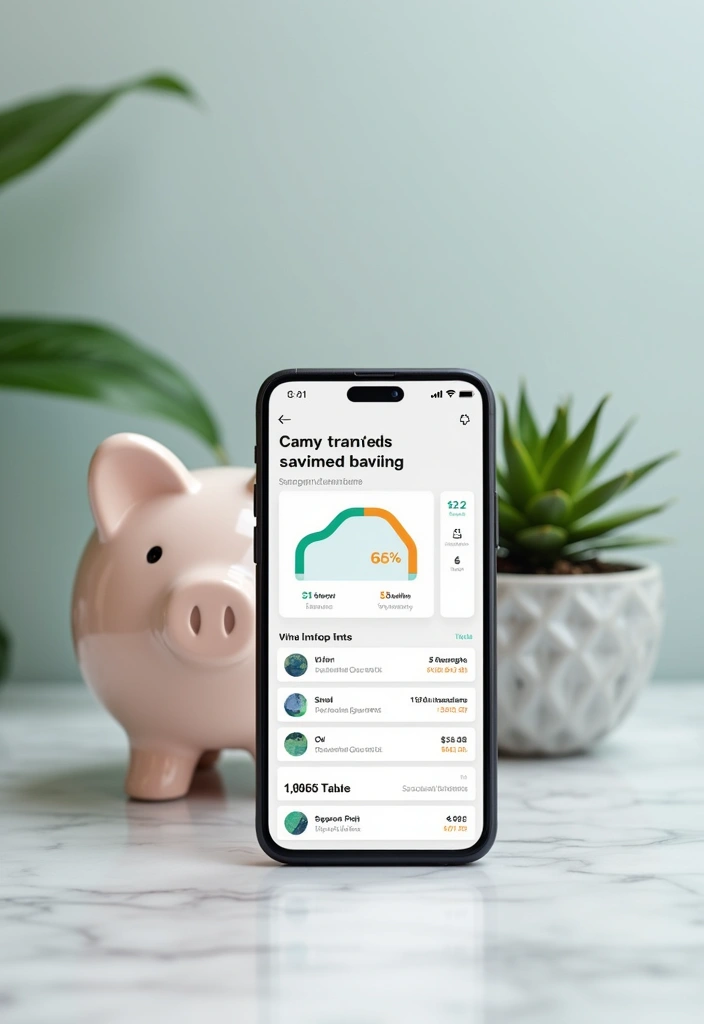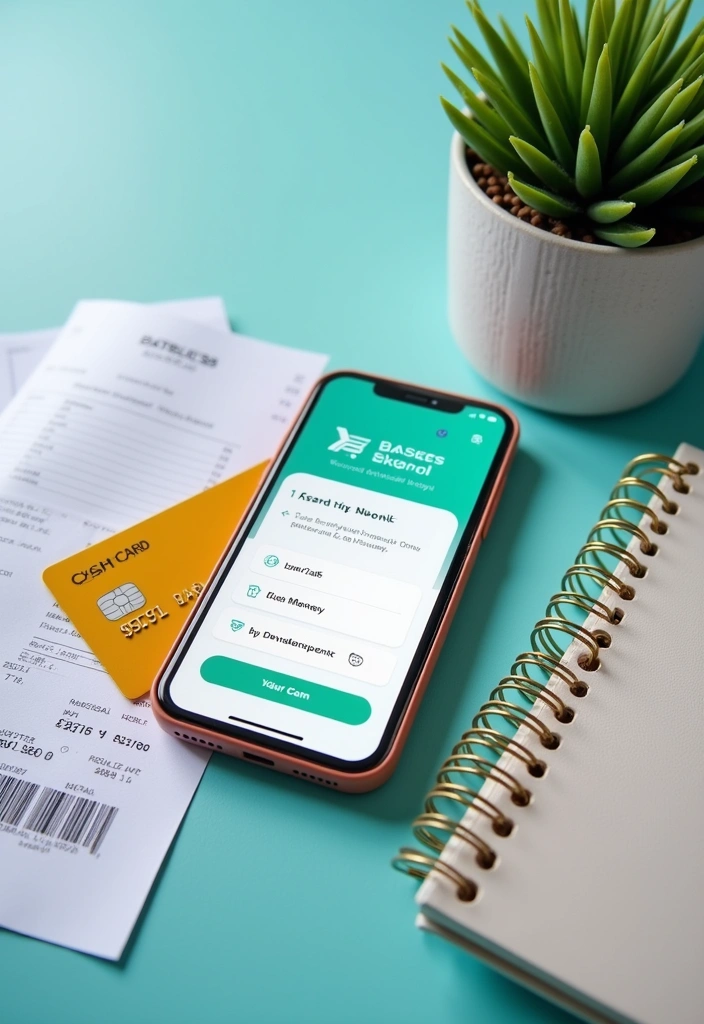In today’s fast-paced world, achieving financial freedom is more important than ever.
Saving money doesn’t have to be a daunting task; with the right strategies, you can significantly boost your savings and live comfortably.
This listicle will share twelve essential personal finance tips designed to help you save big and pave the way toward financial independence.
Get ready to transform your relationship with money, and be sure to keep an eye out for the surprising tip at number five!
Contents
- 1. Automate Your Savings
- 2. Create a Budget that Works
- 3. Track Your Spending
- 4. Cut Unnecessary Expenses
- 5. Take Advantage of Cashback Rewards (You Won’t Believe This!)
- 6. Set Financial Goals
- 7. Embrace Minimalism
- 8. Use the 50/30/20 Rule
- 9. Shop Smart with Lists
- 10. Invest in Yourself
- 11. Consider Side Hustles
- 12. Regularly Review Your Finances
1. Automate Your Savings

Automating your savings is akin to putting your financial aspirations on cruise control. By simply configuring your bank settings or using an automated savings app, you can seamlessly redirect a portion of your paycheck into a dedicated savings account.
This approach not only simplifies the saving process but also guarantees that you’re consistently setting aside funds for emergencies, vacations, or significant purchases.
To further enhance your saving strategy, consider utilizing a financial goal tracker to keep your objectives in sight and motivated.
Additionally, it’s wise to explore various options with a savings account comparison guide to ensure you’re getting the best interest rates available. By treating your savings like a must-pay bill, your wealth can grow steadily over time!
2. Create a Budget that Works

Crafting a budget is crucial for anyone seeking to take charge of their financial situation. A well-structured budget allows you to monitor your income, expenses, and savings effectively.
Begin by compiling all your income sources, and categorize your expenditures into fixed and variable costs. To facilitate this process, consider using a budgeting planner that can help you organize your finances in a visually appealing manner.
Additionally, an expense tracking app can simplify the task of monitoring your spending habits, enabling you to see where your money goes each month.
With the right tools in hand, including a comprehensive financial literacy course, you will not only save more but also empower yourself to make informed and confident spending decisions.
3. Track Your Spending

To save effectively, it’s crucial to first understand where your money is going. Tracking your spending can uncover surprising patterns and highlight areas where you may be overspending.
Consider utilizing expense tracking software or a spending tracker notebook to monitor your daily expenses. Categorizing these expenses into essential and non-essential items will help you pinpoint areas where you can cut back.
By gaining insight into your spending habits, you’ll be better equipped to redirect funds towards savings and ultimately gain more control over your financial future. Additionally, if you feel overwhelmed, seeking guidance from a financial coaching service can provide personalized support in managing your finances effectively.
4. Cut Unnecessary Expenses

Identifying and eliminating unnecessary expenses is essential for boosting your savings. A great first step is to review your monthly subscriptions and memberships—ask yourself if you truly need each one.
Utilizing a subscription management app can help you keep track of all your recurring charges and identify which ones you can cut out.
Additionally, consider exploring alternatives, such as free versions of apps or services. You might also want to invest in a discount coupon book to find deals that will save you even more money on everyday purchases.
By reassessing your spending habits and making these adjustments, you can free up significant funds that can be redirected to your savings account. Remember, every little bit counts, and you may be surprised by how much you can save!
5. Take Advantage of Cashback Rewards (You Won’t Believe This!)

Cashback rewards have the potential to significantly enhance your savings without requiring you to change your spending habits. By utilizing a cashback credit card for your everyday purchases, you can earn a percentage back on everything you buy, effectively turning routine expenses into savings.
Imagine your regular bills and grocery shopping contributing to your financial goals effortlessly!
However, it’s crucial to manage your finances wisely by paying off your balance in full each month. This practice helps you avoid interest charges that could erase the benefits of your cashback rewards.
Additionally, consider subscribing to a cashback app to maximize your savings opportunities and stay updated on the best deals available.
With the right approach, including reading insightful tips from a personal finance book, you can leverage cashback rewards to pave your way towards greater financial freedom!
6. Set Financial Goals

Establishing clear financial goals is essential for providing direction and motivation throughout your savings journey. Whether you’re aiming to save for a dream vacation, a new car, or building an emergency fund, having specific targets will help you maintain focus.
To enhance your goal-setting process, consider using a goal-setting planner. This tool allows you to break your larger objectives into smaller, manageable milestones, making it easier to track your progress effectively.
Additionally, incorporating vision board supplies can serve as visual reminders, keeping your goals at the forefront of your mind. When you can visually see your advancements, you’re more likely to remain committed to your savings plan.
If you feel you need extra guidance, consider investing in a financial coaching service to help you refine your goals and strategies.
7. Embrace Minimalism

Adopting a minimalist lifestyle can have a profound effect on your financial health. By concentrating on your true needs and eliminating the excess, you can save not just money but also valuable space in your life.
Minimalism fosters a mindset of thoughtful spending, which helps curb impulse purchases and encourages more deliberate financial decisions. To get started on your minimalist journey, consider picking up a minimalist guidebook that offers insights and practical tips.
As you begin to declutter your life, a decluttering checklist can serve as an invaluable resource to keep you organized and focused. You’ll likely find that with each item you let go, you gain more clarity in your finances and reduce the allure of unnecessary spending.
This transformative mindset can pave the way for significant savings over time. If you’re looking to deepen your understanding of simple living, consider enrolling in a simple living course that can guide you towards a more financially free lifestyle.
8. Use the 50/30/20 Rule

The 50/30/20 rule is a simple yet effective budgeting strategy that divides your income into three key categories: 50% for essential needs, 30% for discretionary wants, and 20% for savings.
By adopting this structured approach, you can ensure that all your basic expenses are covered while still enjoying some flexibility for leisure and future financial goals.
To help you implement this rule seamlessly, consider using a budgeting calculator to track your allocations and make adjustments as necessary.
Additionally, investing in financial planning software can provide you with comprehensive tools to analyze your spending habits and optimize your budget.
For further insights and strategies, don’t forget to check out some personal finance books that can deepen your understanding and improve your financial literacy.
By following the 50/30/20 rule and utilizing these resources, you can achieve a balanced budget while prioritizing your financial goals effectively.
9. Shop Smart with Lists

Shopping with a list is one of the simplest yet most effective strategies for saving money. Before you head to the store, take a moment to create a comprehensive list of the items you actually need. Sticking to this list helps you avoid impulse purchases, which can quickly derail your budget.
In addition to saving money, shopping with a list can save you valuable time as you navigate the aisles with purpose. To enhance this experience, consider using a shopping list app that allows you to create and share lists easily, ensuring you stay on track and focused on your goals.
Moreover, if you want to take your budgeting a step further, a grocery budget planner can help you manage your spending more effectively. Pair this with a meal prep guide to streamline your shopping and cooking process, ensuring you not only obtain the essentials but do so within your budget. With a well-planned list and the right tools, you can significantly reduce your spending while still enjoying all the necessities.
10. Invest in Yourself

Investing in your skills and education is one of the smartest financial moves you can make, yielding substantial returns both personally and professionally. By enrolling in online course subscriptions, you can access a wealth of knowledge at your fingertips, enhancing your expertise in various fields.
Additionally, attending skill development workshops allows you to gain practical experience and network with industry professionals, which could open doors to new career opportunities.
Complementing your learning with financial literacy books can also empower you to make informed decisions about your money.
Remember, the more you invest in yourself, the more valuable you become in the job market, potentially leading to higher income prospects. This commitment to self-improvement is a long-term investment that can significantly pay off over time, so don’t hesitate to allocate funds towards your growth—it’s one of the best financial decisions you can make.
11. Consider Side Hustles

In the modern gig economy, embracing side hustles can be an excellent strategy to boost your income. Whether you choose to engage in freelancing through platforms like freelancing platforms, sell handmade crafts, or drive for rideshare services, the opportunities are virtually limitless.
Take a moment to reflect on your skills and interests; consider how you can effectively monetize them during your free time.
The additional income generated from these efforts can be strategically funneled directly into your savings, significantly speeding up your journey to financial independence.
For those new to the side hustle world, a comprehensive side hustle guide can provide valuable insights and tips to get started.
Moreover, utilizing online selling tools can enhance your efficiency and success in selling products, allowing you to explore your passions while simultaneously improving your financial landscape.
12. Regularly Review Your Finances

Taking the time to regularly review your finances is essential for maintaining a healthy financial life. Set aside a dedicated time each month to evaluate your budget, spending patterns, and savings objectives.
This reflection allows you to make necessary adjustments and celebrate milestones along the way. To enhance this process, consider utilizing financial review software that offers valuable insights into your spending habits and helps you visualize your overall financial health.
Additionally, employing budgeting apps can streamline your tracking, making it easier to stay within your budget. If you’re looking for professional guidance, a personal finance consultation can provide tailored strategies to help you reach your financial goals.
By consistently reviewing your finances, you ensure that you remain aware of your financial situation, empowering you to make informed and effective decisions.
Conclusion

Achieving financial freedom doesn’t have to be an elusive dream.
By implementing these personal finance tips, you can save big and take control of your financial future.
Start today by selecting a few strategies that resonate with you, and watch your savings grow over time!
Note: We aim to provide accurate product links, but some may occasionally expire or become unavailable. If this happens, please search directly on Amazon for the product or a suitable alternative.
This post contains Amazon affiliate links, meaning I may earn a small commission if you purchase through my links, at no extra cost to you.



